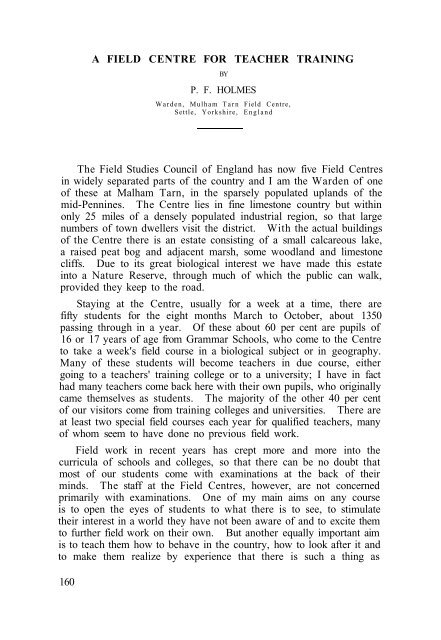septième réunion technique seventh technical meeting ... - IUCN
septième réunion technique seventh technical meeting ... - IUCN
septième réunion technique seventh technical meeting ... - IUCN
- No tags were found...
Create successful ePaper yourself
Turn your PDF publications into a flip-book with our unique Google optimized e-Paper software.
A FIELD CENTRE FOR TEACHER TRAINING<br />
BY<br />
P. F. HOLMES<br />
Warden, Mulham Tarn Field Centre,<br />
Settle, Yorkshire, England<br />
The Field Studies Council of England has now five Field Centres<br />
in widely separated parts of the country and I am the Warden of one<br />
of these at Malham Tarn, in the sparsely populated uplands of the<br />
mid-Pennines. The Centre lies in fine limestone country but within<br />
only 25 miles of a densely populated industrial region, so that large<br />
numbers of town dwellers visit the district. With the actual buildings<br />
of the Centre there is an estate consisting of a small calcareous lake,<br />
a raised peat bog and adjacent marsh, some woodland and limestone<br />
cliffs. Due to its great biological interest we have made this estate<br />
into a Nature Reserve, through much of which the public can walk,<br />
provided they keep to the road.<br />
Staying at the Centre, usually for a week at a time, there are<br />
fifty students for the eight months March to October, about 1350<br />
passing through in a year. Of these about 60 per cent are pupils of<br />
16 or 17 years of age from Grammar Schools, who come to the Centre<br />
to take a week's field course in a biological subject or in geography.<br />
Many of these students will become teachers in due course, either<br />
going to a teachers' training college or to a university; I have in fact<br />
had many teachers come back here with their own pupils, who originally<br />
came themselves as students. The majority of the other 40 per cent<br />
of our visitors come from training colleges and universities. There are<br />
at least two special field courses each year for qualified teachers, many<br />
of whom seem to have done no previous field work.<br />
Field work in recent years has crept more and more into the<br />
curricula of schools and colleges, so that there can be no doubt that<br />
most of our students come with examinations at the back of their<br />
minds. The staff at the Field Centres, however, are not concerned<br />
primarily with examinations. One of my main aims on any course<br />
is to open the eyes of students to what there is to see, to stimulate<br />
their interest in a world they have not been aware of and to excite them<br />
to further field work on their own. But another equally important aim<br />
is to teach them how to behave in the country, how to look after it and<br />
to make them realize by experience that there is such a thing as<br />
160
















